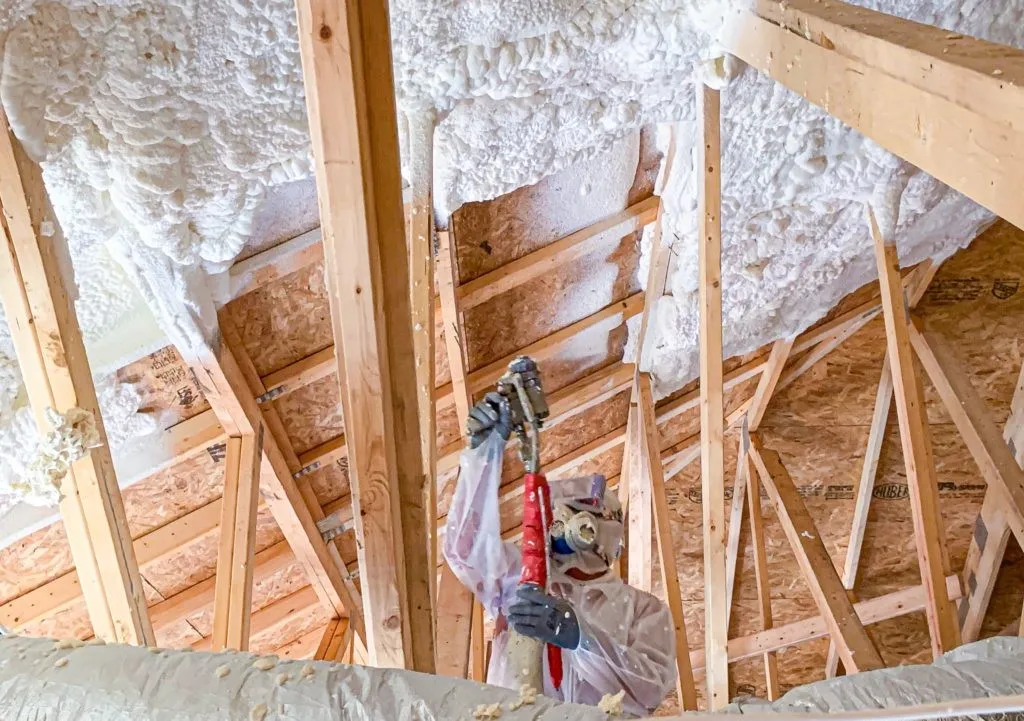
Open-cell spray foam insulation is famous for improving energy efficiency and indoor comfort. Yet, concerns about potential issues like roof rot have led many Tampa residents to wonder if this material is the right option for their home. Let’s explore the facts to determine whether open-cell spray foam insulation poses a risk to your roof and whether it might be a valuable solution for your property.
Open-cell spray foam is an insulation that forms an expansive barrier by trapping air bubbles within its structure. It is soft, flexible, and permeable to vapor. Due to its lightweight and energy-efficient properties, open-cell spray foam is commonly used for attics, walls, and other residential applications across Tampa. It fills every nook and cranny, creating a tight seal that effectively reduces air leakage, lowering energy costs and increasing comfort.
Open-cell spray foam differs from its closed-cell counterpart in a few key ways:
While these characteristics make it an effective insulation solution, they are also the reason why some people believe it could lead to roof problems, particularly roof rot. Let’s dig deeper into this claim.
The idea that open-cell spray foam insulation will “rot your roof” is primarily based on misunderstandings about how moisture interacts with insulation and roofing materials. This misconception often originates from situations where improper installation has caused moisture problems, leading to long-term damage.
The logic behind this myth is that the vapor-permeable nature of open-cell foam could allow moisture to accumulate in the attic or roof decking, leading to potential mold or rot. While moisture management is a critical concern in any construction or insulation project, the notion that open-cell foam inherently leads to roof rot needs to be more generalized.
Roof rot results from persistent moisture exposure combined with a lack of ventilation. It occurs when water, in liquid or vapor form, becomes trapped against wood materials, leading to decay. Causes of roof rot typically include:
When open-cell spray foam is used correctly, it should not cause roof rot. However, installation must be performed by a knowledgeable professional who understands how to manage airflow and moisture in a roof assembly.
Open-cell spray foam is relatively easy for your roof if moisture is managed correctly. Here’s how it can impact moisture control and air circulation:
In Tampa, where high humidity is common, evaluating the ventilation in your attic before and after installing open-cell spray foam is essential. A professional installer will assess this to ensure sufficient airflow and recommend ventilation solutions if necessary.
The risks associated with open-cell spray foam insulation often come down to installation. Properly installed open-cell spray foam will not cause roof rot. However, improper installation can lead to potential issues, such as:
A professional spray foam contractor will evaluate the conditions of your attic, roof, and home to determine whether open-cell spray foam is suitable and how best to install it to ensure long-term performance.
Tampa’s climate is characterized by high humidity and warm temperatures throughout the year. These conditions make it crucial to get insulation and moisture control right. Here’s how open-cell spray foam plays a role:
For those considering open-cell spray foam insulation, working with an experienced contractor who knows the specific challenges of insulating homes in Tampa is essential. Here are some tips to ensure a safe and effective installation:
Open-cell spray foam insulation can be an excellent choice for enhancing comfort and efficiency, but proper installation is crucial—especially in a humid climate like Tampa. If you’re interested in open-cell spray foam or want to explore other insulation options, contact On the Mark Spray Foam Insulation today.
Our experienced team serves homeowners and businesses across Tampa and surrounding counties, providing expert insulation solutions tailored to your needs. From fiberglass to spray foam to specialized structural repair services, we are committed to making your property comfortable and efficient.
Call us today at (813) 921-0444 or visit https://onthemarksprayfoam.net/ to learn more. You can also email us at info@onthemarksprayfoam.net. Let us help you.
1. Does open-cell spray foam insulation cause roof rot?
No, roof rot is caused by improper installation or moisture management, not by the foam itself.
2. Is open-cell spray foam suitable for Tampa’s climate?
Yes, it works well when properly installed with ventilation and moisture control.
3. How does open-cell spray foam compare to closed-cell spray foam?
Open-cells are more affordable and allow vapor movement; closed-cells are denser and resist moisture.
4. Can open-cell spray foam reduce energy bills?
It improves efficiency by sealing air leaks, reducing heating and cooling costs.